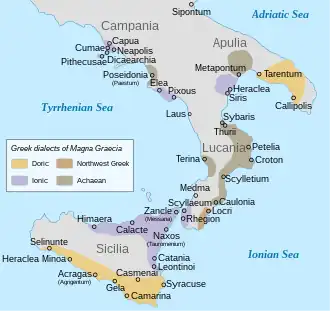This list of ancient Greek philosophers contains philosophers who studied in ancient Greece or spoke Greek. Ancient Greek philosophy began in Miletus with the pre-Socratic philosopher Thales[1][2] and lasted through Late Antiquity. Some of the most famous and influential philosophers of all time were from the ancient Greek world, including Socrates, Plato and Aristotle.
↵Abbreviations used in this list:
- c. = circa
- fl. = flourished
See also
References
External links
This article is issued from Wikipedia. The text is licensed under Creative Commons - Attribution - Sharealike. Additional terms may apply for the media files.
